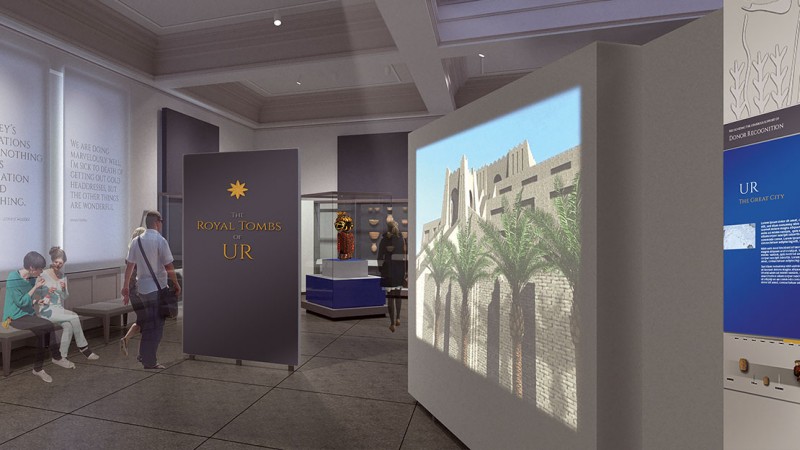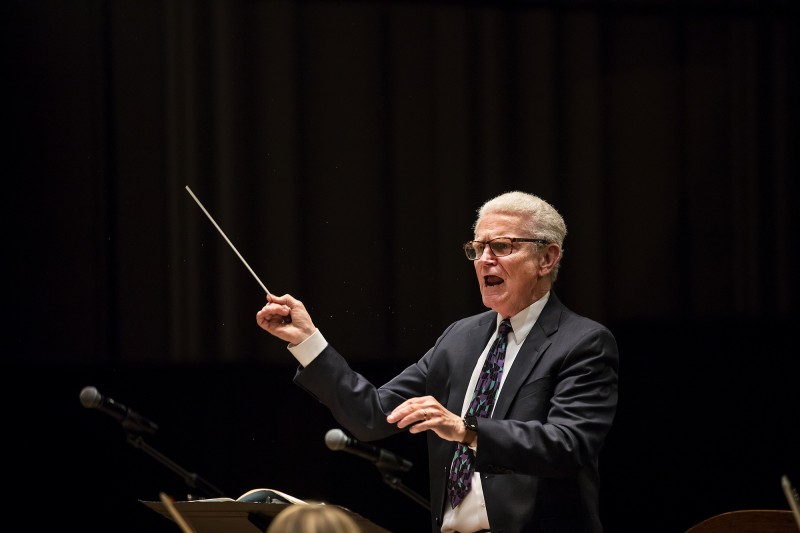Announcing the University of Pennsylvania’s Landmark Fundraising and Engagement Campaign to Strengthen World Impact
 University of Pennsylvania President Amy Gutmann and Board of Trustees Chair David L. Cohen announced the launch of a $4.1 billion comprehensive fundraising and engagement campaign that will strengthen Penn’s support for students, investment in faculty and improvement of lives through a wide range of initiatives building on Penn’s unique cross-disciplinary culture. The Power of Penn: Advancing Knowledge for Good will support vital University-wide programs and priorities across Penn’s 12 schools and six centers, including Penn Medicine.
University of Pennsylvania President Amy Gutmann and Board of Trustees Chair David L. Cohen announced the launch of a $4.1 billion comprehensive fundraising and engagement campaign that will strengthen Penn’s support for students, investment in faculty and improvement of lives through a wide range of initiatives building on Penn’s unique cross-disciplinary culture. The Power of Penn: Advancing Knowledge for Good will support vital University-wide programs and priorities across Penn’s 12 schools and six centers, including Penn Medicine.
“Universities are the engines of knowledge, understanding and new ideas that propel communities and societies forward. As such, we have a fundamental responsibility to be a force for good,” President Gutmann said. “This Campaign will ensure that Penn-generated multidisciplinary knowledge has a more powerful and positive impact on our local, national and global communities.”
Among Penn’s prime strengths is its foundational commitment to diversity and inclusion. The Power of Penn Campaign will continue to strengthen Penn’s financial aid program for undergraduate, graduate and professional students, while also advancing initiatives to create a stronger, more responsive support system for first-generation and high-need students.
Noting that one out of eight Penn freshman represents the first generation in their family to attend college, and one of four is either first generation or low income (or both). President Gutmann said, “As a first-generation, low-income student myself, I know how life-changing financial aid can be.”
The other two institutional strengths that are core to The Power of Penn Campaign priorities are Innovation and Impact, which together with Inclusion have guided the direction of the University throughout President Gutmann’s presidency.
Mr. Cohen, chair of Penn’s Board of Trustees, emphasized the importance of strengthening the endowment to support Penn’s innovators, researchers and entrepreneurs. “A successful Campaign will enable us to expand student aid and augment cutting-edge programs through endowment funding,” he said, “and endowing new positions for faculty and staff leaders will secure Penn’s role as a cradle of innovation through the 21st century and beyond.” He added, “The Trustees are fully supportive of The Power of Penn Campaign and we are fortunate to have the extraordinary leadership of Bob Levy as chair and Lee Spelman Doty as vice chair.”
“The Power of Penn Campaign will be critical to Penn’s mission to innovate and create solutions where none now exist,” said Campaign Chair Robert M. Levy, highlighting that Penn research generated three FDA approvals over the past year. “It will enable Penn to advance more research initiatives, foster student entrepreneurship and develop new technologies that make a crucial impact.”
The Campaign will also bring several significant capital projects to Penn’s campus. Notable among these are the construction of New College House West; the Venture Lab, led by Penn Wharton Entrepreneurship; and the Pavilion at the Hospital of the University of Pennsylvania, the largest capital project in Penn’s history, which will set new standards for patient comfort and care.
“Penn has all the elements needed to make a positive and lasting impact,” said Mr. Levy, noting, “the ability to integrate knowledge across diverse disciplines, an inclusive campus environment and a global community driven to make a difference.”
Mr. Levy added that the Campaign will create more opportunities for the wider Penn family to engage in the life of the University. “The Power of Penn will offer our alumni, parents and friends new ways to make an impact on the issues they are most passionate about.”
President Gutmann sees The Power of Penn as a unique opportunity for Penn to strengthen its influence on issues of global significance. “We have done so much to improve lives worldwide,” she said, “but there is much more we can do to address urgent issues. With this Campaign, we are stepping up our response—and stepping up to the plate.”
Abraham Nitzan: Donner Professor
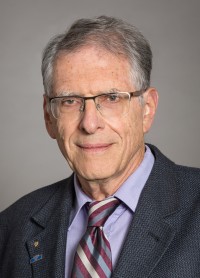
Abraham Nitzan, professor of chemistry, has been named Donner Professor of Physical Sciences. Dr. Nitzan’s research focuses on the interaction of light with molecular systems, chemical reactions in condensed phases and interfaces and charge transfer processes in such environments. He came to Penn from Tel Aviv University in 2015, where he held the Kodesh Chair of Chemical Dynamics.
Dr. Nitzan is the recipient of the Humboldt Award; the Israel Chemical Society Award (2003) and Medal (2015); the EMET Prize and the Israel Prize in Chemistry; and the Joseph O. Hirschfelder Prize in Theoretical Chemistry (2017-2018). He is a Foreign Honorary member of the American Academy of Arts and Sciences, a Foreign Associate of the U.S. National Academy of Sciences, a member of the Israel Academy of Sciences and Humanities and a Fellow of the American Physical Society and of the American Association for the Advancement of Science.
The Donner Professorship of Physical Sciences was established in 1958 by the Donner Foundation, now known as the Independence Foundation.
Joseph Subotnik: Edmund J. and Louise W. Kahn Term Professor

Joseph Subotnik, professor of chemistry, has been named Edmund J. and Louise W. Kahn Term Professor of Chemistry. A theoretical chemist who focuses on electronic processes in the condensed phase, Dr. Subotnik has made key contributions in electronic structure theory, chemical dynamics and statistical mechanics. Going beyond standard techniques from perturbation theory, he has developed novel nonadiabatic approaches to achieve a comprehensive theoretical and computational understanding of electronic relaxation (from excited to ground states), electron transfer, energy transfer and multilinear spectroscopy. He has received many prizes and awards, including a Guggenheim Fellowship, an Alfred P. Sloan Research Fellowship, a National Science Foundation Career Advancement Award, the Presidential Early Career Award for Science and Engineering (PECASE), a Packard Fellowship for Science and Engineering, the Research Corporation Cottrell Scholar Award and a Camille Dreyfus Teacher-Scholar Award.
The Kahn endowed term chairs were established through a bequest by Mr. and Mrs. Edmund J. Kahn. Mr. Kahn was a 1925 Wharton graduate who had a highly successful career in the oil and natural gas industry. His wife, a graduate of Smith College, worked for Newsweek and owned an interior design firm. The couple supported many programs and projects in the University of Pennsylvania, including Van Pelt-Dietrich Library, the Modern Languages College House and other initiatives in scholarship and the humanities.
Graduate School of Education Excellence in Teaching Award
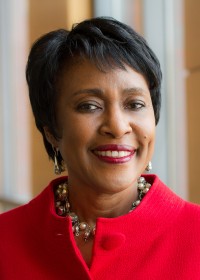
Vivian Gadsden, the William T. Carter Professor of Child Development and Education, director of the National Center on Fathers and Families, and associate director for the National Center on Adult Literacy, is the recipient of the GSE Excellence in Teaching Award. She was recently named a faculty co-leader of the Penn Futures Project. Students describe Dr. Gadsden’s class as a place where they can be vulnerable while working through questions of how race and class affect child development. By simultaneously serving as a teacher, a mentor, a researcher and a thought leader whose work is shaping public policy, she demonstrates the many ways her students can make an impact. When they graduate, Dr. Gadsden’s students say they are prepared to testify on behalf of the children they will serve.
School of Nursing Teaching Awards
Dean’s Award for Exemplary Teaching
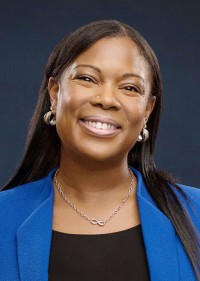 Lisa M. Lewis is an associate professor in the department of family and community health, a Calvin Bland Fellow and the assistant dean for Diversity and Inclusivity. She teaches Psychological and Social Diversity in Health and Wellness to undergraduate Nursing students and co-teaches Health Equity: Conceptual, Linguistic, Methodological, and Ethical Issues to T32 trainees and other doctoral students. She has had a holistic impact on the growth and success of our teaching mission across all curricula. Her students note the clarity of her insights and the creativity of her lesson planning in addition to her compassion and empathy. As one pre-doctoral fellow states, “She makes not only the academic success of her students a priority but also the overall well-being of the student….She believes that her success is exemplified in the success of her students.” A teaching collaborator notes, “I felt my own teaching was enriched by her collegiality and feedback.” Dr. Lewis demonstrates an ability to break down barriers and foster meaningful experiences for all at Penn Nursing.
Lisa M. Lewis is an associate professor in the department of family and community health, a Calvin Bland Fellow and the assistant dean for Diversity and Inclusivity. She teaches Psychological and Social Diversity in Health and Wellness to undergraduate Nursing students and co-teaches Health Equity: Conceptual, Linguistic, Methodological, and Ethical Issues to T32 trainees and other doctoral students. She has had a holistic impact on the growth and success of our teaching mission across all curricula. Her students note the clarity of her insights and the creativity of her lesson planning in addition to her compassion and empathy. As one pre-doctoral fellow states, “She makes not only the academic success of her students a priority but also the overall well-being of the student….She believes that her success is exemplified in the success of her students.” A teaching collaborator notes, “I felt my own teaching was enriched by her collegiality and feedback.” Dr. Lewis demonstrates an ability to break down barriers and foster meaningful experiences for all at Penn Nursing.
Dean’s Award for Teaching Excellence
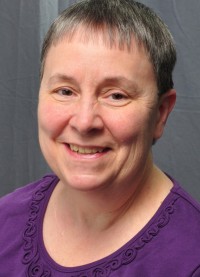 Loretta A. Sernekos, a senior lecturer in the department of biobehavioral health sciences, teaches physiology, pathophysiology, therapeutics, cell biology and microbiology to undergraduate and master’s students. Her knowledge and innovative teaching style enables them to think critically and compassionately. One student noted, “She encourages deep critical thinking and problem-solving through her engaging classes. Most important, she promotes and enhances the image of nursing as the cross-section of compassionate inquiry and creative science.” In addition to providing mentorship to former students, she also seeks input from them about their clinical experiences to inform her teaching and invites them to tutor current students. And from a peer: “Dr. Sernekos goes above and beyond in developing and enhancing the learning experience for her students….She exemplifies the encouragement and steadfastness of a committed teacher—the gift that Dr. Sernekos provides for her students that is unconditionally necessary for excellence in teaching.”
Loretta A. Sernekos, a senior lecturer in the department of biobehavioral health sciences, teaches physiology, pathophysiology, therapeutics, cell biology and microbiology to undergraduate and master’s students. Her knowledge and innovative teaching style enables them to think critically and compassionately. One student noted, “She encourages deep critical thinking and problem-solving through her engaging classes. Most important, she promotes and enhances the image of nursing as the cross-section of compassionate inquiry and creative science.” In addition to providing mentorship to former students, she also seeks input from them about their clinical experiences to inform her teaching and invites them to tutor current students. And from a peer: “Dr. Sernekos goes above and beyond in developing and enhancing the learning experience for her students….She exemplifies the encouragement and steadfastness of a committed teacher—the gift that Dr. Sernekos provides for her students that is unconditionally necessary for excellence in teaching.”
Dean’s Award for MS/MSN/DNP Scholarly Mentorship
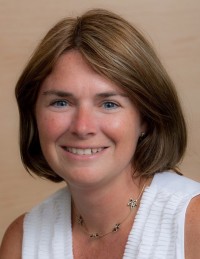 Patricia Griffith is an advanced senior lecturer in the biobehavioral health sciences department teaching in the Adult Gerontology Acute Care Nurse Practitioner Program (AGACNP) master’s program. Ms. Griffith’s students express a deep appreciation for her patience, attention to detail, follow-through and kindness. She demonstrates a commitment that cuts across all stages of academic development. Writes one student: “[She] is genuinely one of the main reasons why I chose Penn for my graduate education. Her dedication to prospective and current students is evident in the amount of time she spends communicating with her students.” Ms. Griffith models an accessibility and command of subject, and has left an indelible mark on her students.
Patricia Griffith is an advanced senior lecturer in the biobehavioral health sciences department teaching in the Adult Gerontology Acute Care Nurse Practitioner Program (AGACNP) master’s program. Ms. Griffith’s students express a deep appreciation for her patience, attention to detail, follow-through and kindness. She demonstrates a commitment that cuts across all stages of academic development. Writes one student: “[She] is genuinely one of the main reasons why I chose Penn for my graduate education. Her dedication to prospective and current students is evident in the amount of time she spends communicating with her students.” Ms. Griffith models an accessibility and command of subject, and has left an indelible mark on her students.
Student Nurses at Penn Undergraduate Award for Teaching
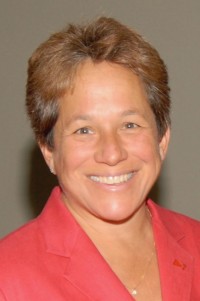 Marlene Etkowicz is a clinical instructor in the Nursing Lab for Integrated Human Anatomy, Physiology and Physical Assessment, and a clinical simulation instructor in the Simulation Lab for Integrated Pathophysiology, Pharmacology and Therapeutics and Nursing of Young, Middle Aged and Older Adults. Throughout all of the labs and simulations that she teaches, she shows that she is a vital part of Penn Nursing’s education mission. Many students who have had her as a lab instructor have praised Ms. Etkowicz for being incredibly knowledgeable, warm and understanding. As one student writes, “Marlene has shown students how much potential we can have and taught students to be confident when tackling simulation test outs.” She has inspired many of her students through sharing about her many years of nursing experience, and always encourages students to ask questions and challenge themselves in her clinical course.
Marlene Etkowicz is a clinical instructor in the Nursing Lab for Integrated Human Anatomy, Physiology and Physical Assessment, and a clinical simulation instructor in the Simulation Lab for Integrated Pathophysiology, Pharmacology and Therapeutics and Nursing of Young, Middle Aged and Older Adults. Throughout all of the labs and simulations that she teaches, she shows that she is a vital part of Penn Nursing’s education mission. Many students who have had her as a lab instructor have praised Ms. Etkowicz for being incredibly knowledgeable, warm and understanding. As one student writes, “Marlene has shown students how much potential we can have and taught students to be confident when tackling simulation test outs.” She has inspired many of her students through sharing about her many years of nursing experience, and always encourages students to ask questions and challenge themselves in her clinical course.
Graduate Student Organization Graduate Nurse Educator Award
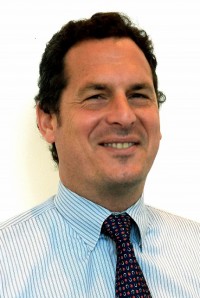 Joseph R. Libonati is an associate professor in the School of Nursing and director of Penn Nursing’s Laboratory of Innovative and Translational Nursing Research. Dr. Libonati has helped thousands of nursing graduate students excel in the clinical setting through his teaching of advanced physiology and pathophysiology over the past 10 years. His dedication to students and passion for teaching are palpable. Dr. Libonati’s teaching style make his courses some of the most challenging, valuable and rewarding academic experiences offered at Penn Nursing. As stated in one nomination, “Dr. Libonati creates an atmosphere in the classroom that is conducive to didactic, professional and clinical growth. He encourages collaboration and collegiality. His multimodal approach to our education is enlightening, strengthening and inspirational. We are undoubtedly stronger clinicians today and in the future because we have been taught by him.”
Joseph R. Libonati is an associate professor in the School of Nursing and director of Penn Nursing’s Laboratory of Innovative and Translational Nursing Research. Dr. Libonati has helped thousands of nursing graduate students excel in the clinical setting through his teaching of advanced physiology and pathophysiology over the past 10 years. His dedication to students and passion for teaching are palpable. Dr. Libonati’s teaching style make his courses some of the most challenging, valuable and rewarding academic experiences offered at Penn Nursing. As stated in one nomination, “Dr. Libonati creates an atmosphere in the classroom that is conducive to didactic, professional and clinical growth. He encourages collaboration and collegiality. His multimodal approach to our education is enlightening, strengthening and inspirational. We are undoubtedly stronger clinicians today and in the future because we have been taught by him.”
Barbara J. Lowery Doctoral Student Organization Faculty Award
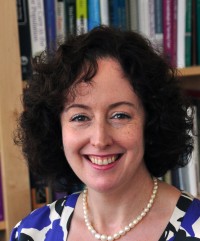 Sarah Hope Kagan is the Lucy Walker Honorary Term Professor of Gerontological Nursing. Dr. Kagan has offered thoughtful mentorship and support to countless doctoral students over her years as a professor at Penn Nursing. Dr. Kagan’s advisement is not limited to individual mentees. In addition to her formal advising and teaching responsibilities, she oversees the Advanced Qualitative Collective, a group of pre- and post-doctoral trainees, faculty and alumni who are interested in qualitative research traditions. She has served on a number of doctoral dissertation committees. This year, Dr. Kagan has reached out in particularly unique and useful ways to help all doctoral students across the program by offering workshops on writing, public speaking and finding a scholarly voice. These opportunities are invaluable and contribute to the renown of the Penn Nursing PhD program and the success and impact of its graduates. Dr. Kagan has shown an unwavering support of doctoral education and commitment to fostering student growth and development.
Sarah Hope Kagan is the Lucy Walker Honorary Term Professor of Gerontological Nursing. Dr. Kagan has offered thoughtful mentorship and support to countless doctoral students over her years as a professor at Penn Nursing. Dr. Kagan’s advisement is not limited to individual mentees. In addition to her formal advising and teaching responsibilities, she oversees the Advanced Qualitative Collective, a group of pre- and post-doctoral trainees, faculty and alumni who are interested in qualitative research traditions. She has served on a number of doctoral dissertation committees. This year, Dr. Kagan has reached out in particularly unique and useful ways to help all doctoral students across the program by offering workshops on writing, public speaking and finding a scholarly voice. These opportunities are invaluable and contribute to the renown of the Penn Nursing PhD program and the success and impact of its graduates. Dr. Kagan has shown an unwavering support of doctoral education and commitment to fostering student growth and development.
Announcing New Enhancements to Penn Marketplace
Yesterday, the University launched a range of technology enhancements to its existing procurement platform, the Penn Marketplace. These new functionalities have been developed to improve administrative efficiencies and the user experience for supplier onboarding, purchase order (PO) invoice processing and the non-PO payment request (current PDA) process. The implementation of these added features will accomplish the following:
- Provide greater visibility into the status of onboarding, invoicing and payment transactions for end users and suppliers;
- Improve efficiencies through automation and supplier self-service; and,
- Enhance Penn’s controls through improved electronic procure-to-pay (P2P) workflows.
More specifically, Penn’s Schools and Centers and its supplier community benefit from the following process improvements:
- Supplier Self-Registration and Self-Service: All suppliers, including both Purchase Order and Non-PO payees upon invitation to register, are able to electronically self-register with Penn via a supplier portal;
- Electronic Invoicing: Suppliers have increased visibility into their purchase orders, invoices and payment statuses while having a greater opportunity to ‘Do Business with Penn’ effectively, regardless of their size; and,
- Electronic Non-PO Payment Requests: The manual, paper PDA forms are no longer the standard vehicle for requesting, approving and processing Non-PO payments/credits and are replaced with electronic forms within Penn Marketplace.
The Penn Marketplace Enhancements initiative has been sponsored by the Divisions of Business Services, Finance, and Information Systems & Computing.
For more information about this initiative, please visit the Penn Purchasing Services website at www.upenn.edu/purchasing or contact the project team at PennMarketplace@upenn.edu
 University of Pennsylvania President Amy Gutmann and Board of Trustees Chair David L. Cohen announced the launch of a $4.1 billion comprehensive fundraising and engagement campaign that will strengthen Penn’s support for students, investment in faculty and improvement of lives through a wide range of initiatives building on Penn’s unique cross-disciplinary culture. The Power of Penn: Advancing Knowledge for Good will support vital University-wide programs and priorities across Penn’s 12 schools and six centers, including Penn Medicine.
University of Pennsylvania President Amy Gutmann and Board of Trustees Chair David L. Cohen announced the launch of a $4.1 billion comprehensive fundraising and engagement campaign that will strengthen Penn’s support for students, investment in faculty and improvement of lives through a wide range of initiatives building on Penn’s unique cross-disciplinary culture. The Power of Penn: Advancing Knowledge for Good will support vital University-wide programs and priorities across Penn’s 12 schools and six centers, including Penn Medicine.



 Lisa M. Lewis is an associate professor in the department of family and community health, a Calvin Bland Fellow and the assistant dean for Diversity and Inclusivity. She teaches Psychological and Social Diversity in Health and Wellness to undergraduate Nursing students and co-teaches Health Equity: Conceptual, Linguistic, Methodological, and Ethical Issues to T32 trainees and other doctoral students. She has had a holistic impact on the growth and success of our teaching mission across all curricula. Her students note the clarity of her insights and the creativity of her lesson planning in addition to her compassion and empathy. As one pre-doctoral fellow states, “She makes not only the academic success of her students a priority but also the overall well-being of the student….She believes that her success is exemplified in the success of her students.” A teaching collaborator notes, “I felt my own teaching was enriched by her collegiality and feedback.” Dr. Lewis demonstrates an ability to break down barriers and foster meaningful experiences for all at Penn Nursing.
Lisa M. Lewis is an associate professor in the department of family and community health, a Calvin Bland Fellow and the assistant dean for Diversity and Inclusivity. She teaches Psychological and Social Diversity in Health and Wellness to undergraduate Nursing students and co-teaches Health Equity: Conceptual, Linguistic, Methodological, and Ethical Issues to T32 trainees and other doctoral students. She has had a holistic impact on the growth and success of our teaching mission across all curricula. Her students note the clarity of her insights and the creativity of her lesson planning in addition to her compassion and empathy. As one pre-doctoral fellow states, “She makes not only the academic success of her students a priority but also the overall well-being of the student….She believes that her success is exemplified in the success of her students.” A teaching collaborator notes, “I felt my own teaching was enriched by her collegiality and feedback.” Dr. Lewis demonstrates an ability to break down barriers and foster meaningful experiences for all at Penn Nursing. Loretta A. Sernekos, a senior lecturer in the department of biobehavioral health sciences, teaches physiology, pathophysiology, therapeutics, cell biology and microbiology to undergraduate and master’s students. Her knowledge and innovative teaching style enables them to think critically and compassionately. One student noted, “She encourages deep critical thinking and problem-solving through her engaging classes. Most important, she promotes and enhances the image of nursing as the cross-section of compassionate inquiry and creative science.” In addition to providing mentorship to former students, she also seeks input from them about their clinical experiences to inform her teaching and invites them to tutor current students. And from a peer: “Dr. Sernekos goes above and beyond in developing and enhancing the learning experience for her students….She exemplifies the encouragement and steadfastness of a committed teacher—the gift that Dr. Sernekos provides for her students that is unconditionally necessary for excellence in teaching.”
Loretta A. Sernekos, a senior lecturer in the department of biobehavioral health sciences, teaches physiology, pathophysiology, therapeutics, cell biology and microbiology to undergraduate and master’s students. Her knowledge and innovative teaching style enables them to think critically and compassionately. One student noted, “She encourages deep critical thinking and problem-solving through her engaging classes. Most important, she promotes and enhances the image of nursing as the cross-section of compassionate inquiry and creative science.” In addition to providing mentorship to former students, she also seeks input from them about their clinical experiences to inform her teaching and invites them to tutor current students. And from a peer: “Dr. Sernekos goes above and beyond in developing and enhancing the learning experience for her students….She exemplifies the encouragement and steadfastness of a committed teacher—the gift that Dr. Sernekos provides for her students that is unconditionally necessary for excellence in teaching.” Patricia Griffith is an advanced senior lecturer in the biobehavioral health sciences department teaching in the Adult Gerontology Acute Care Nurse Practitioner Program (AGACNP) master’s program. Ms. Griffith’s students express a deep appreciation for her patience, attention to detail, follow-through and kindness. She demonstrates a commitment that cuts across all stages of academic development. Writes one student: “[She] is genuinely one of the main reasons why I chose Penn for my graduate education. Her dedication to prospective and current students is evident in the amount of time she spends communicating with her students.” Ms. Griffith models an accessibility and command of subject, and has left an indelible mark on her students.
Patricia Griffith is an advanced senior lecturer in the biobehavioral health sciences department teaching in the Adult Gerontology Acute Care Nurse Practitioner Program (AGACNP) master’s program. Ms. Griffith’s students express a deep appreciation for her patience, attention to detail, follow-through and kindness. She demonstrates a commitment that cuts across all stages of academic development. Writes one student: “[She] is genuinely one of the main reasons why I chose Penn for my graduate education. Her dedication to prospective and current students is evident in the amount of time she spends communicating with her students.” Ms. Griffith models an accessibility and command of subject, and has left an indelible mark on her students. Marlene Etkowicz is a clinical instructor in the Nursing Lab for Integrated Human Anatomy, Physiology and Physical Assessment, and a clinical simulation instructor in the Simulation Lab for Integrated Pathophysiology, Pharmacology and Therapeutics and Nursing of Young, Middle Aged and Older Adults. Throughout all of the labs and simulations that she teaches, she shows that she is a vital part of Penn Nursing’s education mission. Many students who have had her as a lab instructor have praised Ms. Etkowicz for being incredibly knowledgeable, warm and understanding. As one student writes, “Marlene has shown students how much potential we can have and taught students to be confident when tackling simulation test outs.” She has inspired many of her students through sharing about her many years of nursing experience, and always encourages students to ask questions and challenge themselves in her clinical course.
Marlene Etkowicz is a clinical instructor in the Nursing Lab for Integrated Human Anatomy, Physiology and Physical Assessment, and a clinical simulation instructor in the Simulation Lab for Integrated Pathophysiology, Pharmacology and Therapeutics and Nursing of Young, Middle Aged and Older Adults. Throughout all of the labs and simulations that she teaches, she shows that she is a vital part of Penn Nursing’s education mission. Many students who have had her as a lab instructor have praised Ms. Etkowicz for being incredibly knowledgeable, warm and understanding. As one student writes, “Marlene has shown students how much potential we can have and taught students to be confident when tackling simulation test outs.” She has inspired many of her students through sharing about her many years of nursing experience, and always encourages students to ask questions and challenge themselves in her clinical course. Joseph R. Libonati is an associate professor in the School of Nursing and director of Penn Nursing’s Laboratory of Innovative and Translational Nursing Research. Dr. Libonati has helped thousands of nursing graduate students excel in the clinical setting through his teaching of advanced physiology and pathophysiology over the past 10 years. His dedication to students and passion for teaching are palpable. Dr. Libonati’s teaching style make his courses some of the most challenging, valuable and rewarding academic experiences offered at Penn Nursing. As stated in one nomination, “Dr. Libonati creates an atmosphere in the classroom that is conducive to didactic, professional and clinical growth. He encourages collaboration and collegiality. His multimodal approach to our education is enlightening, strengthening and inspirational. We are undoubtedly stronger clinicians today and in the future because we have been taught by him.”
Joseph R. Libonati is an associate professor in the School of Nursing and director of Penn Nursing’s Laboratory of Innovative and Translational Nursing Research. Dr. Libonati has helped thousands of nursing graduate students excel in the clinical setting through his teaching of advanced physiology and pathophysiology over the past 10 years. His dedication to students and passion for teaching are palpable. Dr. Libonati’s teaching style make his courses some of the most challenging, valuable and rewarding academic experiences offered at Penn Nursing. As stated in one nomination, “Dr. Libonati creates an atmosphere in the classroom that is conducive to didactic, professional and clinical growth. He encourages collaboration and collegiality. His multimodal approach to our education is enlightening, strengthening and inspirational. We are undoubtedly stronger clinicians today and in the future because we have been taught by him.” Sarah Hope Kagan is the Lucy Walker Honorary Term Professor of Gerontological Nursing. Dr. Kagan has offered thoughtful mentorship and support to countless doctoral students over her years as a professor at Penn Nursing. Dr. Kagan’s advisement is not limited to individual mentees. In addition to her formal advising and teaching responsibilities, she oversees the Advanced Qualitative Collective, a group of pre- and post-doctoral trainees, faculty and alumni who are interested in qualitative research traditions. She has served on a number of doctoral dissertation committees. This year, Dr. Kagan has reached out in particularly unique and useful ways to help all doctoral students across the program by offering workshops on writing, public speaking and finding a scholarly voice. These opportunities are invaluable and contribute to the renown of the Penn Nursing PhD program and the success and impact of its graduates. Dr. Kagan has shown an unwavering support of doctoral education and commitment to fostering student growth and development.
Sarah Hope Kagan is the Lucy Walker Honorary Term Professor of Gerontological Nursing. Dr. Kagan has offered thoughtful mentorship and support to countless doctoral students over her years as a professor at Penn Nursing. Dr. Kagan’s advisement is not limited to individual mentees. In addition to her formal advising and teaching responsibilities, she oversees the Advanced Qualitative Collective, a group of pre- and post-doctoral trainees, faculty and alumni who are interested in qualitative research traditions. She has served on a number of doctoral dissertation committees. This year, Dr. Kagan has reached out in particularly unique and useful ways to help all doctoral students across the program by offering workshops on writing, public speaking and finding a scholarly voice. These opportunities are invaluable and contribute to the renown of the Penn Nursing PhD program and the success and impact of its graduates. Dr. Kagan has shown an unwavering support of doctoral education and commitment to fostering student growth and development.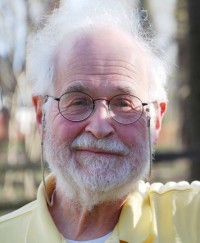 George L. Gerstein, an emeritus professor of neuroscience in Penn’s Perelman School of Medicine, died in Winter Park, Florida, on March 28. He was 85.
George L. Gerstein, an emeritus professor of neuroscience in Penn’s Perelman School of Medicine, died in Winter Park, Florida, on March 28. He was 85.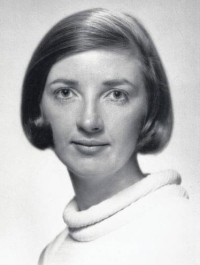 Barbara Johnson Huber, a retired Penn staff relations manager—familiar to most as Barbara Johnson—died in Gallipolis, Ohio, on April 3. She was 81.
Barbara Johnson Huber, a retired Penn staff relations manager—familiar to most as Barbara Johnson—died in Gallipolis, Ohio, on April 3. She was 81.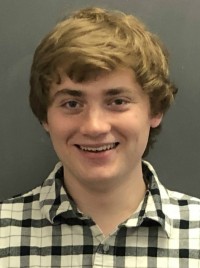 Two juniors at Penn, Angus Beane and Marcello Chang, have been selected as Goldwater Scholars by the Barry Goldwater Scholarship and Excellence in Education Foundation, which provides scholarships of up to $7,500 for undergraduate students interested in pursuing research careers in the natural sciences, math or engineering. Mr. Beane and Mr. Chang are the 38th and 39th recipients from Penn since the United States Congress established the foundation in 1986 to honor the work of U.S. Sen. Barry Goldwater.
Two juniors at Penn, Angus Beane and Marcello Chang, have been selected as Goldwater Scholars by the Barry Goldwater Scholarship and Excellence in Education Foundation, which provides scholarships of up to $7,500 for undergraduate students interested in pursuing research careers in the natural sciences, math or engineering. Mr. Beane and Mr. Chang are the 38th and 39th recipients from Penn since the United States Congress established the foundation in 1986 to honor the work of U.S. Sen. Barry Goldwater.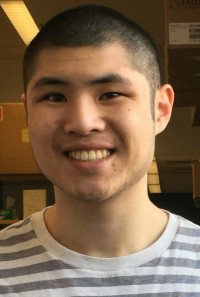 Mr. Chang, a biochemistry, biophysics, computer science and physics major in SAS and SEAS, is from Carmichael, California. His career goal is to earn a PhD in computational biology, conduct research in the life sciences by applying computer science and engineering technology and become a faculty member at a research university.
Mr. Chang, a biochemistry, biophysics, computer science and physics major in SAS and SEAS, is from Carmichael, California. His career goal is to earn a PhD in computational biology, conduct research in the life sciences by applying computer science and engineering technology and become a faculty member at a research university.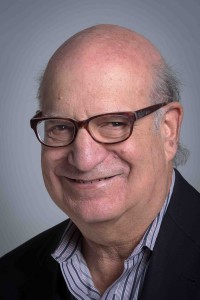 Two University of Pennsylvania professors, Charles L. Bosk and Charles Yang, have been awarded 2018 John Simon Guggenheim Memorial Foundation Fellowships. They are among 173 scholars, artists and scientists selected from nearly 3,000 applicants.
Two University of Pennsylvania professors, Charles L. Bosk and Charles Yang, have been awarded 2018 John Simon Guggenheim Memorial Foundation Fellowships. They are among 173 scholars, artists and scientists selected from nearly 3,000 applicants. Dr. Yang, professor of linguistics and computer science in the School of Arts and Sciences and the School of Engineering and Applied Science, is also the director of the Cognitive Science Program at Penn. He will use his fellowship to support a new line of research exploring how children learn to count and how they develop the conceptual understanding of numbers. He plans to study children’s counting in several languages with varying degrees of numerical complexity, including American Sign Language, where counting is done by hands but also follows linguistic rules.
Dr. Yang, professor of linguistics and computer science in the School of Arts and Sciences and the School of Engineering and Applied Science, is also the director of the Cognitive Science Program at Penn. He will use his fellowship to support a new line of research exploring how children learn to count and how they develop the conceptual understanding of numbers. He plans to study children’s counting in several languages with varying degrees of numerical complexity, including American Sign Language, where counting is done by hands but also follows linguistic rules.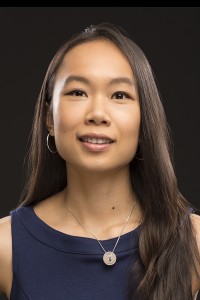 Wendy Chan, GSE assistant professor, was recently awarded $36,033.50 from the Spencer Foundation for the project Assessing the Role of Covariates and Matching in Improving Bounds for Generalization and in Understanding Generalizations Over Time. The goal of this project is two-fold: It investigates the impact of covariates and matching methods on improving the precision of bound estimates of population average treatment effects; and it explores the extent to which generalizations from experimental studies are made to populations defined at a future time point.
Wendy Chan, GSE assistant professor, was recently awarded $36,033.50 from the Spencer Foundation for the project Assessing the Role of Covariates and Matching in Improving Bounds for Generalization and in Understanding Generalizations Over Time. The goal of this project is two-fold: It investigates the impact of covariates and matching methods on improving the precision of bound estimates of population average treatment effects; and it explores the extent to which generalizations from experimental studies are made to populations defined at a future time point.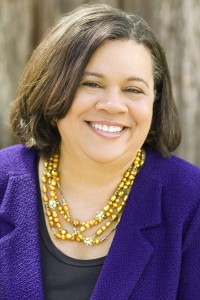 Linda Oubré, who received her EdD in higher education management from Penn in 2017, has been appointed Whittier College’s 15th president and will take office on July 1. Dr. Oubré will be the first person of color to lead Whittier College in Whittier, California.
Linda Oubré, who received her EdD in higher education management from Penn in 2017, has been appointed Whittier College’s 15th president and will take office on July 1. Dr. Oubré will be the first person of color to lead Whittier College in Whittier, California.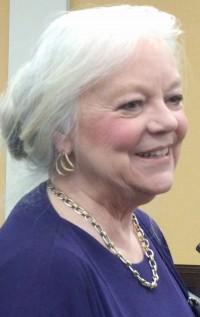 Elizabeth Julian, founder and senior counsel of Dallas-based Inclusive Communities Project, is the recipient of the 14th annual Urban Leadership Award, given by Penn IUR. In 2015, The Inclusive Communities Project won a Supreme Court case ruling that policies, which even inadvertently cause segregation are illegal under the Fair Housing Act. This landmark ruling will help to fully realize the original goals of the Fair Housing Act to not only prevent individual housing discrimination but also address the decades of systemic discrimination that led to segregated communities across the country. Prior to her work with Inclusive Communities, Ms. Julian served as Assistant Secretary for Fair Housing and Equal Opportunity at the U.S. Department of Housing and Urban Development under the Clinton administration, and has practiced poverty and civil rights law since the beginning of her career.
Elizabeth Julian, founder and senior counsel of Dallas-based Inclusive Communities Project, is the recipient of the 14th annual Urban Leadership Award, given by Penn IUR. In 2015, The Inclusive Communities Project won a Supreme Court case ruling that policies, which even inadvertently cause segregation are illegal under the Fair Housing Act. This landmark ruling will help to fully realize the original goals of the Fair Housing Act to not only prevent individual housing discrimination but also address the decades of systemic discrimination that led to segregated communities across the country. Prior to her work with Inclusive Communities, Ms. Julian served as Assistant Secretary for Fair Housing and Equal Opportunity at the U.S. Department of Housing and Urban Development under the Clinton administration, and has practiced poverty and civil rights law since the beginning of her career.





